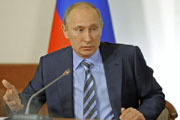VOA标准英语2011--Russia's Pro-Democracy Protests Cloud Putin's March Election Plan(在线收听)
Russia's Pro-Democracy Protests Cloud Putin's March Election Plan
For Vladimir Putin, three months may feel like a political lifetime. The sudden rise of Russia’s democracy movement is posing the biggest challenge yet to his 12-year strongman rule.
It sounded like a TV game show.
In a tightly choreographed event, Russian President Dmitry Medvedev announced that he would swap jobs with Prime Minister Vladimir Putin ... after the formality of presidential elections March 4.
But three months and one controversial parliamentary election later, about 100,000 people came out in Moscow to chant: “Russia Without Putin.”
What snapped in Russia? Voices from the crowd give an answer.
Alexei Vladimirov drove 150 kilometers from Tver to join the December 24 protest. He said Russia has never had fair elections, but that 20 years after the end of communism, now is the time for real democracy here.
Svetlana Slepova came to the protest with white balloons. She said white symbolizes the democracy movement’s desire for peaceful reform.
 |
| Russian Prime Minister Vladimir Putin attends a meeting of All Russia People's Front, an umbrella movement of his supporters, in Moscow, December 27, 2011. |
Stanislav Gerasimov, a 24-year-old computer programmer, speaks for Russia’s new, politically active middle class. He said a critical mass of Russians have stopped fearing the government. They believe that government should serve the people - not the other way around.
Prime Minister Putin recently charged on national TV that some demonstrators are being paid to stage protests. Gerasimov and others see that as an insult.
He said Russian protesters are not paid - certainly not by [U.S.] Secretary of State Hillary Clinton or President Barack Obama. Gerasimov said people are taking part in protest actions voluntarily, to take part in what they see as a historic moment in Russia’s history.
History of revolutions
Russia went through two revolutions in the 20th century - the first to implant communism, the second to root it out.
For now, the opposition’s goal is to postpone presidential elections to late April. They want new faces and new parties competing in a free and fair vote. Alexei Navalny, the opposition’s rising star, said Tuesday he would be a candidate.
At the protest, Navalny threatened to take a crowd and storm the Kremlin if the pro-democracy demonstrators are rebuffed in the weeks ahead.
Gerasimov and his girlfriend want reform, not another revolution. Drawing on Russia’s turbulent 20th-century history, they say no one wants to execute the czar or fire tank shells at the prime minister’s office.
Internet, democracy and coming election
For the next 10 weeks, the key will be continued access to free Internet space. This protester said she and her friends organize entirely through the Internet.
She said Russia’s state-controlled TV channels all lie, and the only place to find the truth is on the Internet.
The next goal for the democracy movement is a protest rally in Moscow attended by one million people. That presumably could have an effect on the March 4 presidential election, which as recently as three months ago analysts were calling Putin’s coronation.
The Kremlin leader says he wants the election to be absolutely transparent, and insists he does not need to rig the vote in order to win what would be his third term as president. However, judging by the rapidly changing mood in Russia, he may now be fighting for his political life.